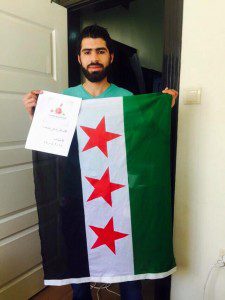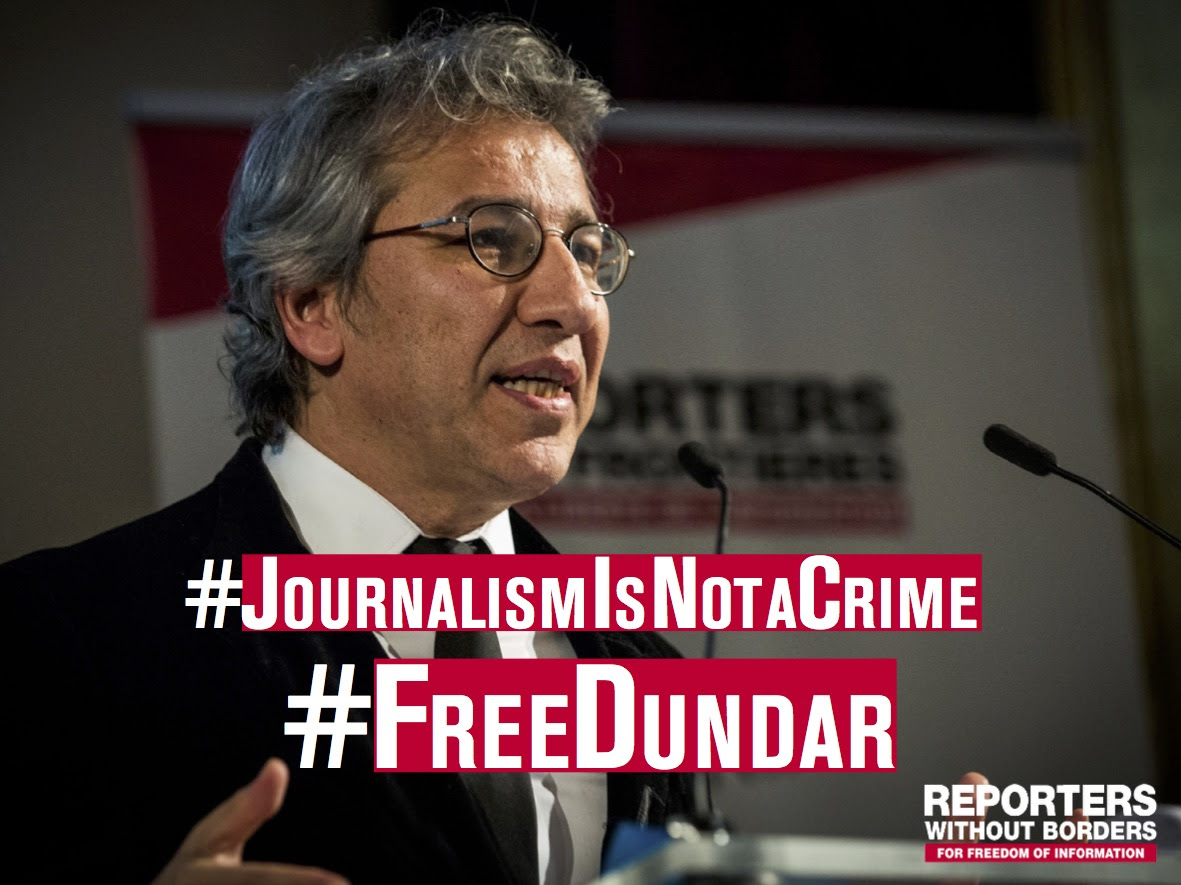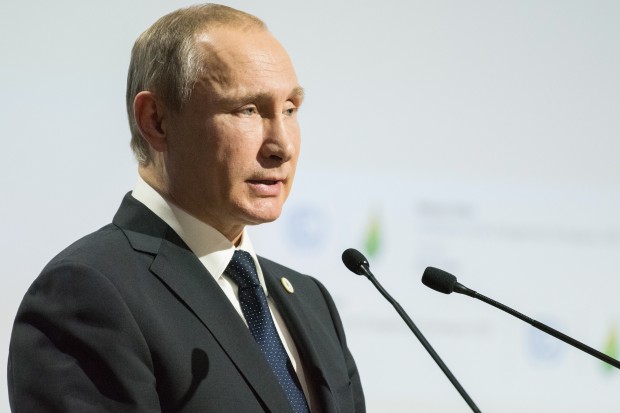22 Dec 2015 | Europe and Central Asia, Mapping Media Freedom, mobile, News, Russia, Turkey
Before 24 November, Turkey was described in Russian news reports as a reliable partner in ambitious projects (TurkStream pipeline, construction of Sochi’s Olympic venues), a source of fruits and vegetables in a period of European food embargoes and Crimea blockade, and one of the main tourist destinations, visited annually by over three million Russians.
But after the downing of the Russian fighter jet, Turkey became the target of a new information war. Reports on estimated growth of turnover and perks at Turkish resorts in Russian state-run media were replaced by a long list of accusations.
Dmitry Kiselev, the head of a state international news agency Rossiya Segodnya and the anchorperson of a weekly programme Vesti Nedeli accused Turkey of buying oil from the Islamic State, exporting carcinogenic vegetables to Russia and trying to revive the Ottoman Empire. Vladimir Soloviev, a popular anchorperson on television channel Rossiya 1, labeled Turkey a sponsor of terrorism.
All media platforms, directly or indirectly controlled by the state, were used in the construction of an image of a new enemy. The past was revised by articles, recalling a long history of Russian-Turkish wars and crimes of the Ottoman Empire. The future was programmed by analysing chances in a possible third world war. Coverage of current affairs has become far from unbiased. News selection has been focused on demonstration of Russia’s sanctions effects and Turkey’s internal problems — oppression of journalists, a growth of child marriage and crime.
After weeks under information attack, on 3 December, Turkish Prime Minister Ahmet Davutoglu dismissed the allegations by Russian media as “lies of this Soviet-style propaganda machine”.
“In the Cold War period, there was a Soviet propaganda machine. Every day it created different lies. Firstly, they would believe them and then expect the world to believe them. These were remembered as Pravda lies and nonsense,” he said.
Days later the Russian state news agency RIA Novosti proved his point by using a classic Soviet propaganda trick. In an op-ed that called Davutoglu “Reich Minister”, RIA Novosti compared the new enemy to the old by appealing to one of the most loathed images for all Russian people since the WWII – Nazi Germany.
This method, as with many others used against Turkey, has been tested and mastered during the Ukrainian crisis. Maidan activists, who later became a new elite of the country, were also labeled by Russian television channels as “fascist nationalists” and “extremists”. The technology of information war, the main propaganda mouthpieces and the image of the enemy remain the same.
On 7 December, Russian Public Opinion Research Center (VTsIOM) published the results of its survey, saying that 73% of Russian population have changed their attitude to Turkey to the worse since the downing of Su-24.
VTsiom, whose director admitted that the main clients of the center are the Kremlin and the ruling party United Russia, has been criticised for manipulation. The results of the survey are symptomatic. If the data is correct, it demonstrates that anti-Turkey propaganda works very well. If the results were rigged in favour of the Kremlin’s agenda, it shows the desirable goal of the information attack.
The day after, on 8 December, a film crew from Russia’s state television channel Rossiya 1 was detained in the Turkish province of Hatay, close to the Syrian border, and deported from the country because of “violations of regulations of work of foreign journalists in the Turkish Republic”. The Ministry of Foreign Affairs of the Russian Federation responded with harsh critiques, accusing Turkey of “a series of infringements of the rights of local and foreign journalists”.
However, in a communique by OSCE Representative on Freedom of the Media on propaganda in times of conflicts, published last year in reference to a similar case related to the Ukrainian crisis, Dunja Mijatović made it clear that censoring propaganda is not the way to counter it. The best way to neutralise propaganda is balance and accuracy in broadcasting, independence of media regulators, prominence of public service broadcasting with a special mission to include all viewpoints, a clear distinction between fact and opinion in journalism and transparency of media ownership.
A similar view was expressed in a speech by Agnès Callamard, the former executive director of ARTICLE 19, delivered at UN Headquarters in December 2014.
“Hatred needs and is fed by censorship, which, in turn, is needed to nurture incitement to the actual commission of atrocity crimes. The lesson is clear: In our efforts to prevent mass atrocities, the free flow of information and freedom of expression are ultimately are our key allies – not our enemies.”
17 Dec 2015 | Campaigns, Middle East and North Africa, mobile, Statements, Syria

Ahmed Mohamed al-Mousa
Index on Censorship strongly condemns the murder of Ahmed Mohamed al-Mousa, a member of the news website and campaigning organisation Raqqa is Being Slaughtered Silently (RBSS).
A non-partisan and independent media collective who report on atrocities perpetrated against the civilian population of Raqqa, the group collected an international press freedom award just last month for their work. Al-Mousa was assassinated by a group of unknown masked men on the same day as Index announced his organisation had been long-listed for Index on Censorship’s 2016 Freedom of Expression Awards.
“In their brave pursuit of the truth and their remarkable commitment to the people of Raqqa, RBSS are shining examples to us all. An idea cannot be lost to violence and intimidation and we stand side-by-side with RBSS and its courageous citizen journalists in their refusal to be silenced,” said Index CEO Jodie Ginsberg.
RBSS affiliates are persistently threatened and al-Mousa is the third journalist affiliated with RBSS who has been murdered by Islamic State militants this year.
In October 2015, journalist Ibrahim Abd al-Qader was killed alongside Fares Hamadi in Urfa, southeastern Turkey with a video since surfacing that claims they were murdered to warn all “apostates [that] they will be slaughtered silently”.
2 Dec 2015 | Magazine, mobile, Volume 44.04 Winter 2015
[vc_row][vc_column][vc_custom_heading text=”What can’t people talk about? The latest magazine looks at taboos around the world”][vc_row_inner][vc_column_inner width=”1/2″][vc_column_text]
What’s taboo today? It might depend where you live, your culture, your religion, or who you’re talking to. The latest issue of Index on Censorship magazine explores worldwide taboos in all their guises, and why they matter. Comedians Shazia Mirza and David Baddiel look at tackling tricky subjects for laughs; Alastair Campbell explains why we can’t be silent on mental health; and Saudi Arabia’s first female feature-film director Haifaa Al Mansour speaks out on breaking boundaries with conservative audiences.
[/vc_column_text][/vc_column_inner][vc_column_inner width=”1/2″][vc_empty_space height=”60px”][vc_single_image image=”71995″ img_size=”full”][/vc_column_inner][/vc_row_inner][vc_column_text]
Plus a crackdown on porn and showing your cleavage in China; growing up in Germany with the ghosts of WW2; what you can and can’t say in Israel and Palestine; and the argument for not editing racism out of old films. As the anniversary of Charlie Hebdo murders approaches, we also have a special section of cartoonists from around the world who have drawn taboos from their homelands – from nudity, atheism and death to domestic violence and necrophilia.
Also in this issue, Mark Frary explores the secret algorithms controlling the news we see, Natasha Joseph interviews the Swaziland editor who took on the king and ended up in prison, and Duncan Tucker speaks to radio journalists who lost their jobs after investigating presidential property deals in Mexico.
And in our culture section, Chilean author Ariel Dorfman looks at the power of music as resistance in an exclusive short story, which is finally seeing the light after 50 years in the pipeline. We have fiction from young writers in Burma tackling changing rules in times of transition, and there’s newly translated poetry written from behind bars in Egypt, amid the continuing crackdown on peaceful protest.
Each magazine sale helps Index on Censorship fight for free expression worldwide. Order your copy here, or take out a digital subscription via Exact Editions (just £18 for the year).
[/vc_column_text][/vc_column][/vc_row][vc_row][vc_column][vc_custom_heading text=”SPECIAL REPORT: WHAT’S THE TABOO? ” css=”.vc_custom_1483453507335{margin-right: 0px !important;margin-left: 0px !important;border-bottom-width: 1px !important;padding-top: 15px !important;padding-bottom: 15px !important;border-bottom-color: #455560 !important;border-bottom-style: solid !important;}”][vc_column_text]
Why breaking down social barriers matters
Stand up to taboos – Shazia Mirza and David Baddiel on how comedy tackles the no-go subjects
The reel world – Nikki Baughan interviews female film directors Susanne Bier and Haifaa Al Mansour, from Denmark and Saudi Arabia
Not just hot air – Kaya Genç goes inside Turkey’s right-wing satire magazine Püff
Slam session – Péter Molnár speaks to fellow Hungarian slam poets about what they can and can’t say
Whereof we cannot speak – Regula Venske on growing up in Germany after WWII
China’s XXX factor – Jemimah Steinfeld investigates a crackdown on porn and cleavage
Pregnant, in danger and scared to speak – Nina Lakhani and Goretti Horgan on abortion laws and social stigma in El Salvador and Ireland
Airbrushing racism – Kunle Olulode explores the problems of erasing racist words from books and films
Why are we whispering? – Alastair Campbell on why discussing mental illness still makes some people uncomfortable
Shouting about sex (workers) – Ian Dunt looks at the debate where everyone wants to silence each other
The history man – Professor Mohammed Dajani Daoudi explains how he has no regrets, despite causing outrage after taking Palestinian students to Auschwitz
Provoking Putin – Oleg Kashin on how new laws are silencing Russians
Quiet zone: a global cartoon special – Featuring taboo-busting illustrations from Bonil, Dave Brown, Osama Eid Hajjaj, Fiestoforo, Ben Jennings, Khalil Rhaman, Martin Rowson, Brian John Spencer, Padrag Srbljanin, Toad and Vilma Vargas
[/vc_column_text][/vc_column][/vc_row][vc_row][vc_column][vc_custom_heading text=”IN FOCUS” css=”.vc_custom_1481731813613{margin-right: 0px !important;margin-left: 0px !important;border-bottom-width: 1px !important;padding-top: 15px !important;padding-bottom: 15px !important;border-bottom-color: #455560 !important;border-bottom-style: solid !important;}”][vc_column_text]
Reining in power – Natasha Joseph talks to the Swaziland editor who took on the king
Whose world are you watching? – Mark Frary explores the secret algorithms controlling the news we see
Bloggers behind bars – Ismail Einashe interviews Ethiopia’s Zone 9 bloggers
Mexican airwaves – Duncan Tucker speaks to radio journalists who were shut down after investigating presidential property deals
Head to head – Bassey Etim and Tom Slater debate whether website moderators are the new censors
Off the map – Irene Caselli on how some of the poorest people in Buenos Aires fought back against Argentina’s mainstream media
[/vc_column_text][/vc_column][/vc_row][vc_row][vc_column][vc_custom_heading text=”CULTURE” css=”.vc_custom_1481731777861{margin-right: 0px !important;margin-left: 0px !important;border-bottom-width: 1px !important;padding-top: 15px !important;padding-bottom: 15px !important;border-bottom-color: #455560 !important;border-bottom-style: solid !important;}”][vc_column_text]
The rocky road to transition – Ellen Wiles introduces new fiction by young Burmese writers Myay Hmone Lwin and Pandora
Sounds of solidarity – Chilean author Ariel Dorfman presents his short story on the power of music as resistance
Poetry from a prisoner – Omar Hazek shares his verses written in an Egyptian jail and translated by Elisabeth Jaquette
[/vc_column_text][/vc_column][/vc_row][vc_row][vc_column][vc_custom_heading text=”COLUMNS” css=”.vc_custom_1481732124093{margin-right: 0px !important;margin-left: 0px !important;border-bottom-width: 1px !important;padding-top: 15px !important;padding-bottom: 15px !important;border-bottom-color: #455560 !important;border-bottom-style: solid !important;}”][vc_column_text]
Global view – Index on Censorship’s CEO, Jodie Ginsberg, on the pull between extremism legislation, free speech and terrorism
Index around the world – Josie Timms presents Index’s latest work and events
[/vc_column_text][/vc_column][/vc_row][vc_row][vc_column][vc_custom_heading text=”END NOTE” css=”.vc_custom_1481880278935{margin-right: 0px !important;margin-left: 0px !important;border-bottom-width: 1px !important;padding-top: 15px !important;padding-bottom: 15px !important;border-bottom-color: #455560 !important;border-bottom-style: solid !important;}”][vc_column_text]
[/vc_column_text][/vc_column][/vc_row][vc_row][vc_column][vc_custom_heading text=”SUBSCRIBE” css=”.vc_custom_1481736449684{margin-right: 0px !important;margin-left: 0px !important;border-bottom-width: 1px !important;padding-bottom: 15px !important;border-bottom-color: #455560 !important;border-bottom-style: solid !important;}”][vc_column_text]Index on Censorship magazine was started in 1972 and remains the only global magazine dedicated to free expression. Past contributors include Samuel Beckett, Gabriel García Marquéz, Nadine Gordimer, Arthur Miller, Salman Rushdie, Margaret Atwood, and many more.[/vc_column_text][vc_row_inner][vc_column_inner width=”1/2″][vc_single_image image=”76572″ img_size=”full”][/vc_column_inner][vc_column_inner width=”1/2″][vc_column_text]In print or online. Order a print edition here or take out a digital subscription via Exact Editions.
Copies are also available at the BFI, the Serpentine Gallery, MagCulture, (London), News from Nowhere (Liverpool), Home (Manchester), Calton Books (Glasgow) and on Amazon. Each magazine sale helps Index on Censorship continue its fight for free expression worldwide.
 SUBSCRIBE NOW[/vc_column_text][/vc_column_inner][/vc_row_inner][/vc_column][/vc_row]
SUBSCRIBE NOW[/vc_column_text][/vc_column_inner][/vc_row_inner][/vc_column][/vc_row]
1 Dec 2015 | Campaigns, Mapping Media Freedom, Statements, Turkey, Turkey Statements

First as prime minister and now as president, Recep Tayyip Erdogan has been waging a methodical crackdown on the media in Turkey for years. Erdogan is persecuting journalists of all colours in an increasingly ferocious manner in the name of combatting terrorism and defending state security. The Erdogan regime’s arrests, threats and intimidation are unworthy of a democracy.
Can Dündar, the editor-in-chief of the Turkish daily Cumhuriyet, and his Ankara bureau chief, Erdem Gül, have been held since the evening of 26 November. They are charged with spying and terrorism because last May they published evidence of arms deliveries by the Turkish intelligence services to Islamist groups in Syria. Both are exemplars of journalism, the search for truth and the defence of freedoms. President Erdogan publicly said that Dündar “will pay for this.” But Cumhuriyet’s journalists just did their job, publishing information that was in the public interest.
At a time when international terrorism is at the centre of everyone’s concerns, it is unacceptable that political prosecutions are used to suppress investigative reporting and exposés. The arrest of these two journalists is the latest extreme to which political use of the Turkish judicial system has been taken. Many journalists have been detained on spurious charges of terrorist propaganda and insulting President Erdogan. The regime has also been using economic levers to put growing pressure on the media, while draconian laws have been passed.
We, public figures, media freedom NGOs and unions, reject the blatant erosion of media freedom in Turkey. The country is ranked 149th out of 180 countries in the Reporters Without Borders press freedom index. Index’s Mapping Media Freedom project has recorded 178 verified reports of media violations since May 2014.
We appeal to the Turkish authorities to free Can Dündar and Erdem Gül without delay, to drop all charges against them, and to free all other journalists who are currently detained in connection with their journalism or the opinions they have expressed.
We also urge the institutions and governments of democratic countries to face up to their responsibilities to respond to President Erdogan’s increasingly authoritarian excesses.
SIGNATORIES
Public figures
Günter Wallraff, journalist, Germany
Noam Chomsky, linguist, USA
Edgar Morin, sociologist, France
Carl Bernstein, journalist, USA
Zülfü Livaneli, writer, Turkey
Ali Dilem, cartoonist, Algeria
Thomas Piketty, economist, France
Claudia Roth, politician, Germany
Paul Steiger, journalist, United States
Kamel Labidi, journalist, Tunisia
John R McArthur, media executive, USA
Fazil Say, pianist, Turkey
Peter Price, media executive, USA
Edwy Plenel, media executive, France
Jim Hoagland, journalist, USA
Ahmet İnsel, political analyst, Turkey
Eric Chol, newspaper editor, France
Nedim Gürsel, writer, Turkey
Cem Özdemir, Green Party copresident, Germany
Hakan Günday, writer, Turkey
Mikis Theodorakis, composer, Greece
Per Westberg, writer, Sweden
Louise Belfrage, journalist, Sweden
Ali Anouzla, journalist, Morocco
Omar Bellouchet, journalist, Algeria
Jack Lang, former government minister, France
Omar Brouksy, journalist, Morocco
Pierre Haski, journalist, France
Jay Weissberg, cinema critic, USA
NGOs
Reporters Without Borders (RSF)
Committee to Project Journalists, (CPJ)
PEN International
International Press Institute (IPI)
World Association of Newspapers and News Publishers (WANIFRA)
Index on Censorship
World Press Freedom Committee (WPFC)
International Federation of Journalists (IFJ)
European Federation of Journalists (EFJ)
Ethical Journalism Network (EJN)
Global Editors Network (GEN)
Turkish Association of Journalists (TGC)
Turkish Union of Journalists (TGS)
DISK Basinİş
Take action: Support the appeal by signing the petition in English, Turkish or French
Mapping Media Freedom
Click on the bubbles to view reports or double-click to zoom in on specific regions. The full site can be accessed at https://mappingmediafreedom.org/
|



